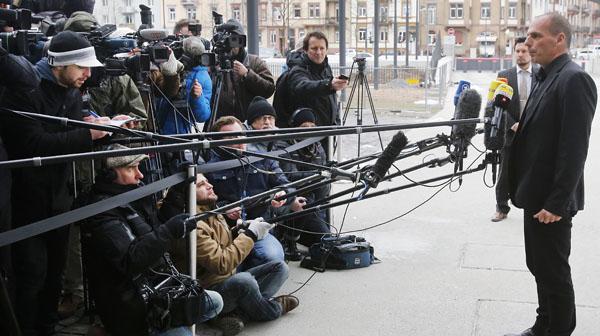You are here
Greece seeks ECB funds, Germany rejects austerity rollback
By Agencies - Feb 05,2015 - Last updated at Feb 05,2015

FRANKFURT/BRUSSELS — Greece's new leftist government appealed to the European Central Bank (ECB) on Wednesday to keep its banks afloat as it seeks to negotiate debt relief with its eurozone partners, but Germany rejected any rollback of agreed austerity policies.
Finance Minister Yanis Varoufakis said after meeting ECB President Mario Draghi in Frankfurt he believed Athens could count on central bank support during the short period it would take to conclude talks with international lenders.
Banking sources told Reuters that two Greek banks have begun to tap emergency liquidity assistance from the Bank of Greece after an outflow of deposits accelerated after the victory of the hard left Syriza party in a general election on January 25.
The Greek government wants that funding to continue because if the ECB were to halt it, Greek banks could collapse, forcing the country out of the eurozone.
Promising to end five years of austerity, Prime Minister Alexis Tsipras and Varoufakis are meeting senior officials across Europe to seek support for a new debt agreement.
However a document prepared by Germany for a meeting of European Union (EU) finance officials on Thursday made clear Berlin wants Athens to go back on promises to raise the minimum wage, halt unpopular sales of national assets, rehire fired public sector workers and reinstate a Christmas bonus for poor pensioners.
"The Eurogroup needs a clear and front-loaded commitment by Greece to ensure full implementation of key reform measures necessary to keep the programme on track," the document, seen by Reuters, said in reference to eurozone finance ministers.
"The aim is the perpetuation of the agreed reform agenda [no rollback of measures], covering major areas as the revenue administration, taxation, public financial management, privatisation, public administration, healthcare, pensions, social welfare, education and the fight against corruption," it added.
A Greek official said the document showed Germany was entering into negotiations, but he added: "It is obvious that these suggestions will not be accepted by the Greek government. They are clashing with the recent mandate given by the Greek people and this do not help with the growth perspective of Europe."
The new Greek leaders have had a cautious reception so far, even in left-leaning countries such as France and Italy which Athens had hoped would support its case for debt relief.
French President Francois Hollande said the eurozone's rules applied to everyone. European Parliament President Martin Schulz, a Socialist, said Greece risked bankruptcy if the country didn't stick to its commitments to EU partners.
European Council President Donald Tusk said after meeting Tsipras in Brussels that any solution must be acceptable to all member states.
‘No doubt’
Tsipras, 40, said after talks with European Commission President Jean-Claude Juncker that Greece respected EU rules and would find a solution to its economic problems within the framework of EU law. There was no agreement yet, but talks were going in the right direction, he noted.
After meeting Draghi, Varoufakis told Reuters: "The ECB is the central bank of Greece ... The ECB will do whatever it takes to support the member states in the eurozone."
"I have no doubt that we can conclude our discussions with our European partners, as well as with the International Monetary Fund (IMF) and the ECB, in a very short space of time so that we can kick-start the Greek economy," he said.
Without the support of its creditors and the ECB, Greece would soon find itself back in an acute financial crisis.
Unable to tap the markets because of sky-high borrowing costs, the government has enough cash to meet its funding needs for the next couple of months. But it faces around 10 billion euros ($11 billion) of debt repayments over the summer.
The ECB's policy making governing council is meeting to discuss whether to extend emergency funding for Greek banks, on what conditions and for how long.
"We outlined to him the main objectives of this government which is to reform Greece in a way that has never been tried before and with a determination that was always absent," Varoufakis said after his session with Draghi.
"We also stated categorically that the debt-deflationary cycle in which Greece finds itself is detrimental to all efforts to reform Greece. He was good enough to explain to us his own constraints," he added.
An ECB source said Draghi had clarified the ECB's institutional mandate and "urged the new government to engage constructively and speedily with the Eurogroup to ensure continued financial stability".
Under ECB rules, Athens needs to be in a bailout programme or actively negotiating a new one to qualify for emergency funding. The government's ability to issue short-term treasury bills to refinance itself is also limited by the bailout agreement.
With the Greek public determined to cast off the stigma of supervision by a troika of EU, International Monetary Fund (IMF) and ECB inspectors, and to regain economic sovereignty, the semantics of any new arrangement may be crucial.
A source familiar with the Greek position said after the talks with Draghi: "We are thinking of a bridging programme. You may not call it a 'programme' for political reasons but perhaps a contract."
The German document demanded that troika oversight continue.
ECB officials in the meeting talked about the rules on emergency funding and their desire that the Greeks reach an interim arrangement with the Eurogroup of eurozone finance ministers, which next meets on February 16, the source said.
Varoufakis has so far said Greece will not extend the bailout programme when it expires on February 28.
Tsipras won the election promising to negotiate a debt write-off, reverse some key reforms and end budget cuts.
Varoufakis has since struck a softer tone, saying Greece aims to swap its official loans for growth-indexed bonds and its ECB loans for perpetual interest-yielding bonds with no repayment date.
Eurozone officials responded coolly, noting that the ideas amount to a partial write-off by other means.
Varoufakis said Athens needs up to six weeks to draft an economic recovery plan.
"We need a maximum of six weeks: that's the time we are seeking from our European partners to be able to finalise a coherent programme of alternative policies to austerity," Varoufakis told Italian newspaper Il Messaggero in an interview published on Wednesday.
In a separate interview with La Repubblica, he indicated that the proposal would see the debt divided up, with the funds owed to the ECB paid back in full on the deadline of July 20.
Those owed to national governments and the IMF however, could instead be swapped for growth-linked bonds, he said.
"We are proposing the other tranches, to the IMF and other countries, be substituted with new bonds at market interest, which is very low right now, with a clause: we will start the entire repayment once Greece's economy sees solid growth," he added.
Varoufakis noted that the idea had already been put to the IMF, adding that he did not see "why they should not accept an extension like they always do in these situations, at least until the end of the year".
Greece wants to be able to introduce "socially compatible reforms... that must above all aim to resolve the humanitarian crisis, as the Greek crisis is more than ever a European crisis", he told Il Messaggero.
The austerity policies, imposed by the EU and IMF in exchange for the bailout loans, have seen the Greece economy contract by a quarter and unemployment shoot up to over 25 per cent, with one in two Greek youths now out of work.
Separately, German officials said on Wednesday that Greece's casually-attired finance minister can dress as he pleases when he visits Berlin this week, provided he offers a sharp account of his government's plans.
Varoufakis has attracted as much attention for his style as for his policies as he tours European capitals.
"The German government has never judged its interlocutors by whether they are wearing a tie, a leather jacket or a classic jacket," Chancellor Angela Merkel's spokesman Steffen Seibert said when asked by reporters about the "new style" in Athens.
"It makes no difference to us. What we expect from the new Greek government is to present us their economic and financial strategy," he added
A spokesman for Finance Minister Wolfgang Schaeuble, who is scheduled to meet Varoufakis on Thursday, said there was no dress code for visitors.
Varoufakis wore an open-necked shirt and a billowing black leather coat to visit the dapper, suited British Finance Minister George Osborne on Monday. His prime minister, Alexis Tsipras, also eschews a tie and received one as a gift from his Italian counterpart Matteo Renzi.
Related Articles
FRANKFURT () — Eurozone ministers approved the launch of Greece bailout talks and the European Central Bank (ECB) boosted its cash lifeline
Fresh tensions emerged Thursday between Greece and Germany as attention turned to Athens's huge debt pile two days after the stricken eurozone country secured an extension of its bailout.
Greek Prime Minister Alexis Tsipras tore into his European Union (EU) allies on Thursday, pledging to "put an end once and for all" to the EU's austerity policies.

















